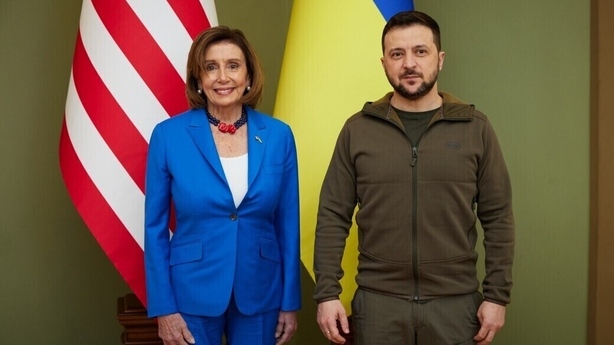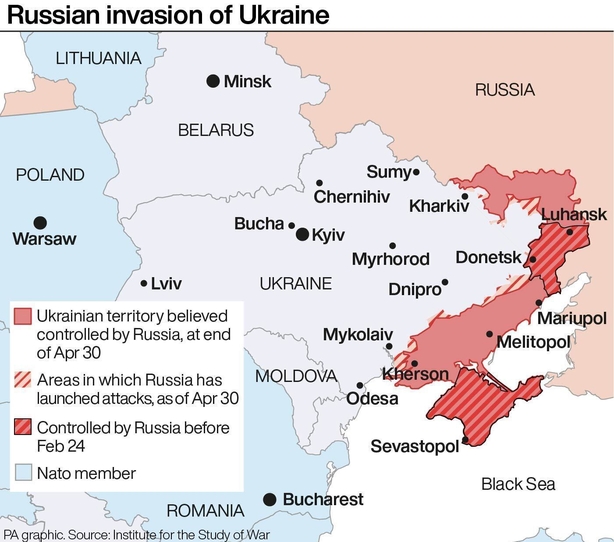Roughly 100 civilians have been evacuated from a besieged steel plant in the eastern Ukrainian city of Mariupol, Ukrainian President Volodymyr Zelensky said today.
The UN said earlier that a "safe passage operation" was going on at the Azovstal plant, the last holdout in the Black Sea port city that has endured a Russian blockade for the full duration of the conflict that began on 24 February.
Russia's defence ministry gave a lower figure of 80 civilians, adding: "Those who wished to leave for areas controlled by the Kyiv regime were handed over to UN and ICRC (Red Cross) representatives."
The UN has not said how many civilians it is transporting and it was not immediately clear why the sides had given different figures.
Thousands have been killed and millions displaced since Russia's invasion, and stories of the harsh conditions in besieged Mariupol have horrified the world.
"Evacuation of civilians from Azovstal began," Mr Zelensky said on Twitter, adding that they were due to arrive in Ukraine-controlled Zaporizhzhia tomorrow.
"Grateful to our team! Now they, together with UN, are working on the evacuation of other civilians from the plant."
The Russian defence ministry earlier confirmed civilians were leaving, releasing a video that showed cars and buses travelling in the dark marked with a "Z", the letter used by the Russian forces in the conflict.
Evacuation of civilians from Azovstal began. The 1st group of about 100 people is already heading to the controlled area. Tomorrow we'll meet them in Zaporizhzhia. Grateful to our team! Now they, together with #UN, are working on the evacuation of other civilians from the plant.
— Володимир Зеленський (@ZelenskyyUa) May 1, 2022
It comes as four civilians were killed in Russian shelling in the town of Lyman as Moscow's forces push deeper into the eastern Donetsk region, the regional governor said.
"On 1 May, four civilians were killed in Russian shelling in the Donetsk region, all in Lyman. Eleven other people were injured," governor Pavlo Kyrylenko said on Telegram.
Pope Francis used his weekly prayer to renew his appeal for humanitarian corridors from the city, saying it had been "bombed and destroyed in a barbaric manner".
Western powers have rushed to send military aid to Ukraine and imposed heavy sanctions on Russia.
"Do not be bullied by bullies," US Speaker of the House Nancy Pelosi told reporters at a news conference in Rzeszow in southern Poland today after returning from Ukraine.
"If they are making threats, you cannot back down."
Ms Pelosi met President Zelensky in Kyiv yesterday, becoming the most senior US figure to visit since the war began.
She promised to enact the €31 billion arms and support package announced by US President Joe Biden last week.

Western powers have also hit Russia with unprecedented sanctions and EU foreign policy chief Josep Borrell said today more measures were in the pipeline.
"We must use our economic and financial abilities to make Russia pay the price for what it is doing," he said.
The conflict is concentrated in the east and south of Ukraine, although there have been Russian missile strikes across the country, mainly targeting infrastructure and supply lines.
Russia's defence ministry also said it had used high-precision Onyx missiles to strike a hangar at a military aerodrome near the Black Sea port city of Odessa housing arms from the United States and European countries and destroyed the runway.
Ukrainian authorities had reported the strike yesterday but said only that it destroyed the runway.
Russia has moved to solidify its grip on areas it controls and from today introduced the Russian ruble in the region of Kherson - initially to be used alongside the Ukrainian hryvnia.
"Beginning 1 May, we will move to the ruble zone," Kirill Stremousov, a civilian and military administrator of Kherson, was cited as saying earlier by Russia's state news agency RIA Novosti.
He said there would be a period of four months in which the hryvnia could be used, but then "we will completely switch to settlements in rubles".
On the front line in the east, Russian troops have advanced slowly but steadily in some areas - helped by massive use of artillery - but Ukrainian forces have also recaptured some territory in recent days, particularly around the city of Kharkiv.

One of the areas taken back from Russian control was the village of Ruska Lozova, which evacuees said had been occupied for two months.
"It was two months of terrible fear. Nothing else, a terrible and relentless fear," Natalia, a 28-year-old evacuee from Ruska Lozova, told AFP after reaching Kharkiv.
Kyiv has admitted that Russian forces have captured a string of villages in the Donbas region and has asked Western powers to deliver more heavy weapons to bolster its defences there.
"Everyone understands that we must guard the line here," lieutenant Yevgen Samoylov of the 81st brigade told AFP as his unit rotated away from the front line near the town of Sviatogirsk.
"We cannot let the enemy move closer, we try to hold it with all our force."
We need your consent to load this rte-player contentWe use rte-player to manage extra content that can set cookies on your device and collect data about your activity. Please review their details and accept them to load the content.Manage Preferences
According to the United Nations, thousands of people have been killed and more than 13 million have been forced to flee their homes since the Russian invasion began on 24 February.
Moscow's assault in the south aims in part to link the area with Crimea as it pushes for complete control of Ukraine's eastern Donbas region, where Russian-backed separatists already controlled parts of Luhansk and Donetsk provinces before the invasion.

